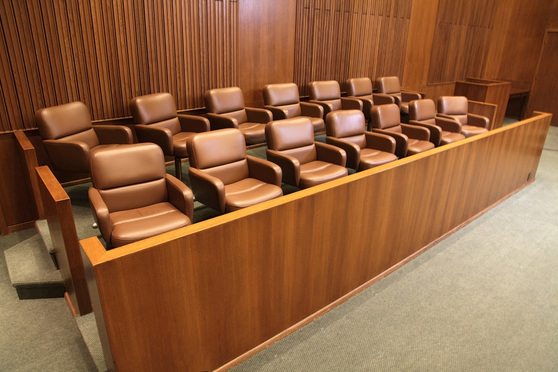Hospital Hit With $3M Verdict in Delco Over 84-Year-Old Man's Fall
A Delaware County jury awarded $3 million to the estate of an 84-year-old man who died after falling and hitting his head while he was a patient at Mercy Fitzgerald Hospital.
April 10, 2018 at 05:46 PM
4 minute read
 Photo: Jason Doiy/ALM
Photo: Jason Doiy/ALM A Delaware County jury awarded $3 million to the estate of an 84-year-old man who died after falling and hitting his head while he was a patient at Mercy Fitzgerald Hospital.
On April 6, after four days of trial in Delaware County Court of Common Pleas Judge G. Michael Green's courtroom and about four hours of deliberations, a 12-member jury rendered the verdict by a 10-2 vote.
According to the verdict slip, the award comprised $2.88 million under the Wrongful Death Act and $114,448 under the Survival Act.
According to the plaintiffs' pretrial memorandum, plaintiff James DeGeorge Sr. had been labeled a fall risk by staff at Mercy Fitzgerald, where he was recuperating from a procedure in which he had a pacemaker inserted.
The plaintiffs alleged in their memorandum that DeGeorge had been given a bed alarm to prevent him from trying to get out of bed on his own, which he had a history of doing.
Shortly before midnight on Jan. 2, 2015, a nurse working the night shift gave DeGeorge an Ambien, which the plaintiffs said in their memorandum is known to inhibit patients' motor function and make them drowsy and forgetful. At 1:30 a.m., the plaintiffs alleged, the nurse placed DeGeorge in a chair that was not equipped with an alarm or any other fall precautions.
DeGeorge, who had already exhibited signs of confusion leading up to that night shift, tried to get out of the chair without assistance, likely in attempt to get back into bed or to use the urinal that had been placed on a side table, the plaintiffs alleged in their memorandum. He fell and hit his head, resulting in a subdural hematoma and a laceration to his ear that required stitches.
He was required to undergo surgery to evacuate the hematoma, according to the plaintiffs memorandum, but subsequently “suffered conscious pain and suffering for weeks” before ultimately being transferred to hospice, where he died Jan. 22, 2015.
The plaintiffs alleged Mercy Hospital was negligent for placing DeGeorge in a chair without first putting fall precautions in place, including failing to provide DeGeorge with a chair alarm. They also alleged that subdural hematoma was ultimately what caused his death.
The defense, however, argued in its own memorandum that “chair alarms do not reduce the risk of falls.”
“Falls in older patients are common and not all falls can be prevented,” the defense memorandum said. ”Some of these falls result in serious injuries. It is not appropriate (nor recommended) to unnecessarily restrict the movements or free choice of older patients who demonstrate the ability to understand instructions and the need to ask for assistance (as was the case with Mr. DeGeorge).”
The defense also argued in its memorandum that the subdural hematoma was only one of several factors that ultimately led to DeGeorge's death, along with his age and “multiple chronic medical problems.”
The jury sided with plaintiffs, however, finding that Mercy Hospital was negligent and that its negligence was a factual cause of harm to DeGeorge.
 Laura Laughlin.
Laura Laughlin. Counsel for DeGeorge's estate, Laura Laughlin of Freiwald Law in Philadelphia, said that while the defense had argued that chair alarms were ineffective in preventing falls, one of the defense experts admitted during testimony to utilizing chair alarms in their own practice.
“That's really what kind of swayed the jury,” Laughlin said, adding that the case also dealt with a medical negligence issue that was easy for jurors to understand.
“I think the jury did the right thing here,” she said. “His fall was preventable.”
Counsel for Mercy Hospital, J. Michael Doyle of Post & Schell in Philadelphia, declined to comment on the case.
This content has been archived. It is available through our partners, LexisNexis® and Bloomberg Law.
To view this content, please continue to their sites.
Not a Lexis Subscriber?
Subscribe Now
Not a Bloomberg Law Subscriber?
Subscribe Now
NOT FOR REPRINT
© 2025 ALM Global, LLC, All Rights Reserved. Request academic re-use from www.copyright.com. All other uses, submit a request to [email protected]. For more information visit Asset & Logo Licensing.
You Might Like
View All
Lawsuit Against Major Food Brands Could Be Sign of Emerging Litigation Over Processed Foods
3 minute read
Kline & Specter and Bosworth Resolve Post-Settlement Fighting Ahead of Courtroom Showdown
6 minute read

'Discordant Dots': Why Phila. Zantac Judge Rejected Bid for His Recusal
3 minute readTrending Stories
Who Got The Work
J. Brugh Lower of Gibbons has entered an appearance for industrial equipment supplier Devco Corporation in a pending trademark infringement lawsuit. The suit, accusing the defendant of selling knock-off Graco products, was filed Dec. 18 in New Jersey District Court by Rivkin Radler on behalf of Graco Inc. and Graco Minnesota. The case, assigned to U.S. District Judge Zahid N. Quraishi, is 3:24-cv-11294, Graco Inc. et al v. Devco Corporation.
Who Got The Work
Rebecca Maller-Stein and Kent A. Yalowitz of Arnold & Porter Kaye Scholer have entered their appearances for Hanaco Venture Capital and its executives, Lior Prosor and David Frankel, in a pending securities lawsuit. The action, filed on Dec. 24 in New York Southern District Court by Zell, Aron & Co. on behalf of Goldeneye Advisors, accuses the defendants of negligently and fraudulently managing the plaintiff's $1 million investment. The case, assigned to U.S. District Judge Vernon S. Broderick, is 1:24-cv-09918, Goldeneye Advisors, LLC v. Hanaco Venture Capital, Ltd. et al.
Who Got The Work
Attorneys from A&O Shearman has stepped in as defense counsel for Toronto-Dominion Bank and other defendants in a pending securities class action. The suit, filed Dec. 11 in New York Southern District Court by Bleichmar Fonti & Auld, accuses the defendants of concealing the bank's 'pervasive' deficiencies in regards to its compliance with the Bank Secrecy Act and the quality of its anti-money laundering controls. The case, assigned to U.S. District Judge Arun Subramanian, is 1:24-cv-09445, Gonzalez v. The Toronto-Dominion Bank et al.
Who Got The Work
Crown Castle International, a Pennsylvania company providing shared communications infrastructure, has turned to Luke D. Wolf of Gordon Rees Scully Mansukhani to fend off a pending breach-of-contract lawsuit. The court action, filed Nov. 25 in Michigan Eastern District Court by Hooper Hathaway PC on behalf of The Town Residences LLC, accuses Crown Castle of failing to transfer approximately $30,000 in utility payments from T-Mobile in breach of a roof-top lease and assignment agreement. The case, assigned to U.S. District Judge Susan K. Declercq, is 2:24-cv-13131, The Town Residences LLC v. T-Mobile US, Inc. et al.
Who Got The Work
Wilfred P. Coronato and Daniel M. Schwartz of McCarter & English have stepped in as defense counsel to Electrolux Home Products Inc. in a pending product liability lawsuit. The court action, filed Nov. 26 in New York Eastern District Court by Poulos Lopiccolo PC and Nagel Rice LLP on behalf of David Stern, alleges that the defendant's refrigerators’ drawers and shelving repeatedly break and fall apart within months after purchase. The case, assigned to U.S. District Judge Joan M. Azrack, is 2:24-cv-08204, Stern v. Electrolux Home Products, Inc.
Featured Firms
Law Offices of Gary Martin Hays & Associates, P.C.
(470) 294-1674
Law Offices of Mark E. Salomone
(857) 444-6468
Smith & Hassler
(713) 739-1250





